University of Stuttgart
| Universität Stuttgart | ||||||||||||||||
 | ||||||||||||||||
Former names | Technical College of Stuttgart | |||||||||||||||
|---|---|---|---|---|---|---|---|---|---|---|---|---|---|---|---|---|
| Motto | Wissenschaft für die Menschen, Menschen für die Wissenschaft (German) | |||||||||||||||
Motto in English | Science for the People, People for the Science | |||||||||||||||
| Type | Public | |||||||||||||||
| Established | 1829 | |||||||||||||||
| Budget | 420 million[1] | |||||||||||||||
| Chancellor | Bettina Buhlmann | |||||||||||||||
| President | Wolfram Ressel | |||||||||||||||
Academic staff | 3,152[1] | |||||||||||||||
Administrative staff | 1,794[1] | |||||||||||||||
| Students | 24,642[2] | |||||||||||||||
| Undergraduates | 13.136[3] | |||||||||||||||
| Postgraduates | 7,309[3] | |||||||||||||||
| 1,682[3] | ||||||||||||||||
| Location | Stuttgart, Baden-Württemberg, Germany | |||||||||||||||
| Campus | Urban/Suburban | |||||||||||||||
| Colors |
| |||||||||||||||
| Nickname | TU Stuttgart | |||||||||||||||
| Affiliations |
German Universities Excellence Initiative CLUSTER PEGASUS ENTREE TU9 EUA TIME | |||||||||||||||
| Website |
www | |||||||||||||||
 | ||||||||||||||||
The University of Stuttgart (German: Universität Stuttgart) is a university located in Stuttgart, Germany. It was founded in 1829 and is organized into 10 faculties.
It is one of the top nine leading technical universities in Germany (TU9) with highly ranked programs in civil, mechanical, industrial and electrical engineering.
The University of Stuttgart is especially known for its excellent reputation in the fields of advanced automotive engineering, efficient industrial and automated manufacturing, process engineering, aerospace engineering and activity-based costing. The academic tradition of the University of Stuttgart goes back to its probably most famous graduate student: Gottlieb Daimler, the Inventor of the automobile.
Along with the Technical University of Munich, the Technical University of Darmstadt and Karlsruhe Institute of Technology, it represents one of the four members of the South German Axis of Advanced Engineering and Management. These four universities, in combination with RWTH Aachen are the top five universities of the aforementioned TU9.
History
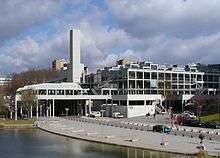
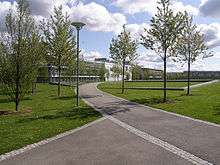
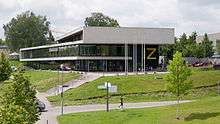
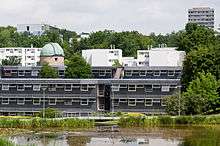
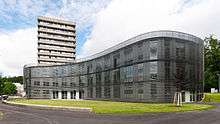
From 1770 to 1794, the Karlsschule was the first university in Stuttgart. Located in Stuttgart-Hohenheim, it has since 1818 been the University of Hohenheim and is not related to the University of Stuttgart, except for some joint activities.
What is now the University of Stuttgart was founded in 1829, and celebrated its 175th anniversary in 2004. Because of the increasing importance of the technical sciences and instruction in these fields, from 1876 the university was known as the Technical College. In 1900 it was awarded the right to grant doctoral degrees in the technical disciplines. The development of the courses of study at the Technical College of Stuttgart led to its renaming in 1967 to the present-day "Universität Stuttgart". With this change of name came along a built-up of new fields, such as history of science and technology and the social sciences, and the extension of existing ones, such as history and art history.
Since the end of the 1950s, a part of the university has been located in the suburb of Stuttgart-Vaihingen. Most technical subjects (computer science, engineering, etc.) are located in Vaihingen, while the humanities, the social sciences, architecture, and similar topics are still located in the city center campus.
Ranking and reputation
Universität Stuttgart is consistently ranked among the world's top universities in various international ranking surveys such as the Academic Ranking of World Universities and the Times Higher Education Supplement which ranks over 1000 universities worldwide. As of 2014, University of Stuttgart is ranked 85th in the world in the field of Engineering & Technology according to QS World University Rankings.[4] University of Stuttgart is one of the best universities in the fields of mechanical, aeronautical, and manufacturing engineering[5] (48th worldwide and 3rd best in Germany) and has been ranked several times as one of the best engineering universities in Germany.[6]
Notable alumni
- Mohamed Moussa, Lebanese
- Jill Asemota, model
- Gunnar Birkerts Architect
- Gustav Bauernfeind German painter, illustrator and architect of Jewish origin
- Volker Beck
- Günter Behnisch Famous German Architect
- Gottlieb Daimler Germany's most famous engineer: The Inventor of "The Automobile" and co-founder (together with Carl Benz) of Mercedes-Benz
- Gerhard Ertl
- Max Eyth
- Gego
- Rudolf Haag Physicist
- Ernst Heinkel
- Rolf-Dieter Heuer
- Wunibald Kamm
- Heinz-Hermann Koelle
- Berthold Leibinger
- Fritz Leonhardt
- Michael Macht Former CEO of Porsche AG
- Wilhelm Maybach Famous German engineer and automobile designer
- Ulf Merbold
- Frieder Nake
- Ulrich Spiesshofer CEO ABB Group
- Horst Störmer Physicist, Nobel prize winner
- Gerald Fredrick Töben
- Martin Winterkorn, former CEO of Volkswagen AG
- Martin Jetter CEO of IBM Deutschland GmbH and IBM Japan, Ltd.
- Karl Ramsayer German Geodesist, Pioneer of Global and German flight navigation
Organization
The university is divided into 10 faculties:[7]
- Faculty of Architecture and Urban Planning
- Faculty of Civil- and Environmental Engineering
- Faculty of Chemistry
- Faculty of Energy Technology, Process Engineering and Biological Engineering
- Faculty of Computer Science, Electrical Engineering and Information Technology
- Faculty of Aerospace Engineering and Geodesy
- Faculty of Engineering Design, Production Engineering and Automotive Engineering (Mechanical Engineering)
- Faculty of Mathematics and Physics
- Faculty of Humanities
- Faculty of Management, Economics and Social Sciences
See also
- List of early modern universities in Europe
- Top Industrial Managers for Europe
- Forschungsinstitut für Kraftfahrwesen und Fahrzeugmotoren Stuttgart
- Historischer Campusführer der Universität Stuttgart (with interactive maps of both campuses)
Notes and references
- 1 2 3 "Zahlen & Fakten". Retrieved 21 July 2015.
- ↑ "Übersicht über die Zahl der Studierenden im Wintersemester 2012/2013" (PDF). November 15, 2012. Retrieved April 14, 2013.
- 1 2 3 https://www.uni-stuttgart.de/ueberblick/wir_ueber_uns/zahlen_fakten/statistik/zahlenspiegel/ZS2012.pdf
- ↑ "QS World University Rankings by Faculty 2013 - Engineering and Technology". Top Universities. Retrieved 21 July 2015.
- ↑ "QS World University Rankings by Subject 2014 - Engineering - Mechanical, Aeronautical & Manufacturing". Top Universities. Retrieved 21 July 2015.
- ↑ "The Top 25 best Universities in Germany - engineering and beyond". Top Universities. Retrieved 21 July 2015.
- ↑ "Faculties & Institutes". Retrieved 21 July 2015.
External links
| Wikimedia Commons has media related to Universität Stuttgart. |
Coordinates: 48°46′54″N 9°10′31″E / 48.78167°N 9.17528°E